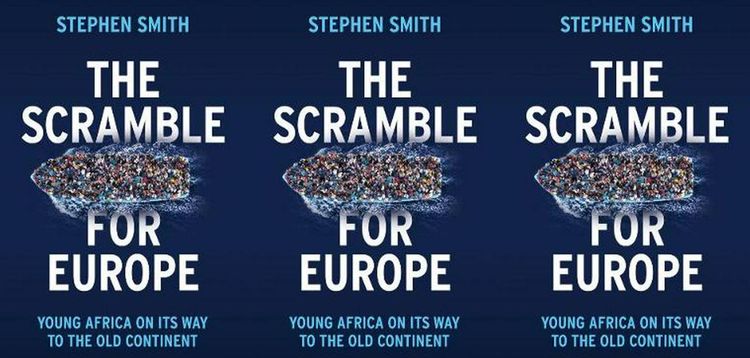


By Steve Sailer
08/19/2019
In National Review, Christopher Caldwell reviews a new book The Scramble for Europe: Young Africa on its way to the Old Continent, a new book by Dr. Stephen Smith of Duke’s African’s Studies department.
The Coming Migration out of Sub-Saharan Africa
By CHRISTOPHER CALDWELL, August 8, 2019 10:24 AM… If Rome and Berlin have been transfixed by a nautical incident involving only a few dozen African seafarers, it is for a simple reason: There are a billion more where those came from. And how Europe addresses African migration is going to determine what the population of the continent looks like a generation from now.
Since the turn of the century, Europeans have been faced with the most basic question about their future: whether they have one. In some countries — especially Italy, Germany, and Austria — the native population has been shrinking for decades. Birth rates have fallen so low that each native generation is about two-thirds the size of the last. …
The population pressures emanating from the Middle East in recent decades, already sufficient to drive the European political system into convulsions, are going to pale beside those from sub-Saharan Africa in decades to come.
Last year Stephen Smith, an American-born longtime Africa correspondent for the Paris dailies Le Monde and Libération, now a professor of African and African-American studies at Duke, published (in French) La ruée vers l’Europe, a short, sober, open-minded book about the coming mass migration out of Africa. The most important book written until then on the subject, it quickly became the talk of Paris. It has now been published in English.
Smith begins by laying out some facts. Africa is adding people at a rate never before seen on any continent. The population of sub-Saharan Africa alone, now about a billion people, will more than double to 2.2 billion people by mid-century, while that of Western Europe will fall to a doddering half billion or so. We should note that the figures Smith uses are not something he dreamed up while out on a walk — they are the official United Nations estimates, which in recent years have frequently underestimated population shifts.
The closer you look, the more disorienting is the change. In 1950 the Saharan country of Niger, with 2.6 million people, was smaller than Brooklyn. In 2050, with 68.5 million people, it will be the size of France. …
In our time the scholarly virtues — detachment, erudition, logic, graceful writing — strike certain partisans as unhelpful, even offensive. European political issues, like American ones, are increasingly matters of “values” and “rights” — whatever you call them, they are not up for negotiation. Immigration may be the most difficult of these issues because it is also an argument over whether or not one side of the debate should be authorized to bring in political reinforcements, in the form of the immigrants themselves. We can now see that those who desire more open borders enjoy an intellectual advantage, too: the ability to block discussion. For, once migration is considered a nonnegotiable right, what end can it serve to start talking about costs and benefits, or simple facts? What innocent explanation can there be for desiring an open debate in the first place?
Read the whole thing there.
CHRISTOPHER CALDWELL — Mr. Caldwell is a contributing editor of the Claremont Review of Books. The Age of Entitlement, his history of America since the Sixties, will be published in January.
Meanwhile, the Washington Post wants to block discussion of population:
Two mass killings a world apart share a common theme: ‘ecofascism’
By Joel Achenbach August 18 at 11:22 AM
Before the slaughter of dozens of people in Christchurch, New Zealand, and El Paso this year, the accused gunmen took pains to explain their fury, including their hatred of immigrants. The statements that authorities think the men posted online share another obsession: overpopulation and environmental degradation. …
In recent years, the mainstream environmental movement has moved strongly in the direction of social justice — the opposite of what hate groups seek. Now, the leaders of those organizations fear white nationalists are using green messages to lure young people to embrace racist and nativist agendas.
“Hate is always looking for an opportunity to grab hold of something,” said Mustafa Santiago Ali, a vice president of the National Wildlife Federation and an expert on environmental justice. “That’s why they use this ecological language that’s been around for a while, and they try to reframe it.”

Mustafa Santiago Ali looks like a real nature lover.

You can tell by the shape of his mustache that he must be constantly disappearing into the wild for weeks at a time with only the barest minimum of essentials that he can carry in a rucksack.
You know he worships animals and the wilderness by how he grooms himself like John Muir rather than, say, Jesus the child-molesting bowler in The Big Lebowski.
Ali, the environmental justice expert, said he often hears people say population growth is the big problem today, and he shoots that down.
“My response to them is, ‘Who are the people we need to limit?” …
Mustafa Santiago Ali, where have you been all the years I’ve been scrounging for iSteve Content??? You look like a one-man iSteve Meme Machine! Well, you and your sidekick Al:
Thank goodness the environmental movement is in the trustworthy hands of guys like Mustafa Santiago Ali.
Can’t load tweet https://x.com/ZbraPntedDonky/status/1163364264632934400: Sorry, that page does not exist